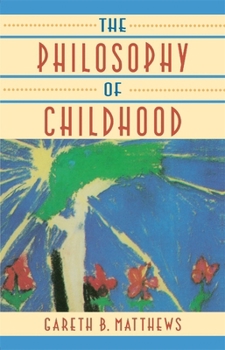The Philosophy of Childhood
Select Format
Select Condition 
Book Overview
So many questions, such an imagination, endless speculation: the child seems to be a natural philosopher--until the ripe old age of eight or nine, when the spirit of inquiry mysteriously fades. What happened? Was it something we did--or didn't do? Was the child truly the philosophical being he once seemed? Gareth Matthews takes up these concerns in The Philosophy of Childhood, a searching account of children's philosophical potential and of childhood as an area of philosophical inquiry. Seeking a philosophy that represents the range and depth of children's inquisitive minds, Matthews explores both how children think and how we, as adults, think about them.
Adult preconceptions about the mental life of children tend to discourage a child's philosophical bent, Matthews suggests, and he probes the sources of these limiting assumptions: restrictive notions of maturation and conceptual development; possible lapses in episodic memory; the experience of identity and growth as "successive selves," which separate us from our own childhoods. By exposing the underpinnings of our adult views of childhood, Matthews, a philosopher and longtime advocate of children's rights, clears the way for recognizing the philosophy of childhood as a legitimate field of inquiry. He then conducts us through various influential models for understanding what it is to be a child, from the theory that individual development recapitulates the development of the human species to accounts of moral and cognitive development, including Piaget's revolutionary model. The metaphysics of playdough, the authenticity of children's art, the effects of divorce and intimations of mortality on a child--all have a place in Matthews's rich discussion of the philosophical nature of childhood. His book will prompt us to reconsider the distinctions we make about development and the competencies of mind, and what we lose by denying childhood its full philosophical breadth.Format:Paperback
Language:English
ISBN:0674664817
ISBN13:9780674664814
Release Date:October 1996
Publisher:Harvard University Press
Length:136 Pages
Weight:0.57 lbs.
Dimensions:0.4" x 5.5" x 8.3"
Customer Reviews
1 rating
children deserve respect
Published by Thriftbooks.com User , 22 years ago
I loved this inspiring book about the true character and intelligence of children, largely unnoticed and under appreciated because of adult misconceptions (reinforced by flawed scientific studies by Piaget, Kohlberg, etc., as this book demonstrates). Chapter 8, Childhood and Death, will be especially interesting to parents of children with terminal leukemia, as we were because of our Jonnie, but this is not a book about death. It is about the ability children have to come to terms with all of life and it's mysteries in fresh and creative ways beyond the abilities of adults. We truly need to learn to respectfully listen to our children, to give our time to watching them and learning from them rather than always trying to teach them. We can't afford to miss their valuable childhood wisdom and insight or to underestimate their contribution to a richer, more complete philosophy of life. Besides, you cannot truly love a child unless you can also respect him. Another inspiring book is How Children Learn by John Holt.





